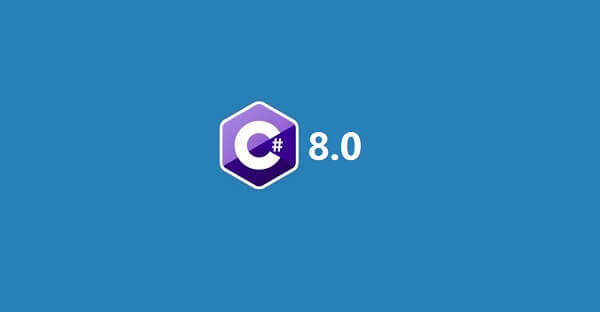
先前在C#的次要版本中引入的所有工具都旨在不大改变语言。 它们更像是语法增强功能,是对C#7.0的新功能的少量补充。
这种方法是有意的,并且仍然有效。
需要在开发的各个阶段(设计,实施和测试)进行更多工作的更严重的更改将仅与主要语言版本一起发布。 尽管C#7的最终次要版本尚未发布,但团队已经在积极开发该语言的下一个主要版本:C#8.0。
在本文中,我计划介绍可能在最终版本中发布的一些当前计划的功能。 所有这些都处于发展的初期,并且可能会发生变化。
可空引用类型
该工具已经在C#7.0开发的早期阶段提供,但是一直推迟到下一个主要版本。 其目标是帮助开发人员避免未处理的NullReferenceException。
主要思想是允许您在确定变量的类型时指定其是否可以为null:
IWeapon? canBeNull;
IWeapon cantBeNull;
null , null -null , ( , , ):
canBeNull = null; //
cantBeNull = null; //
cantBeNull = canBeNull; //
, nullable- null:
canBeNull.Repair(); //
cantBeNull.Repair(); //
if (canBeNull != null) {
cantBeNull.Repair(); //
}
, : , null. , null- .
nullability , . , .
Visual Studio 2017 15.6 update.
Records
, - C# , -.
:
public class Sword(int Damage, int Durability);
:
public class Sword : IEquatable<Sword>
{
public int Damage { get; }
public int Durability { get; }
public Sword(int Damage, int Durability)
{
this.Damage = Damage;
this.Durability = Durability;
}
public bool Equals(Sword other)
{
return Equals(Damage, other.Damage)
&& Equals(Durability, other.Durability);
}
public override bool Equals(object other)
{
return (other as Sword)?.Equals(this) == true;
}
public override int GetHashCode()
{
return (Damage.GetHashCode() * 17 + Durability.GetHashCode());
}
public void Deconstruct(out int Damage, out int Durability)
{
Damage = this.Damage;
Durability = this.Durability;
}
public Sword With(int Damage = this.Damage, int Durability
= this.Durability) => new Sword(Damage, Durability);
}
, , . GetHashCode - Dictionary Hashtable. Deconstruct :
var (damage, durability) = sword;
, , , . , , . , , With, :
var strongerSword = sword.With(Damage: 8);
, :
var strongerSword = sword with { Damage = 8 };
Recursive Patterns
C# 7.0. 8.0 :
. Deconstruct():
if (sword is Sword(10, var durability)) {
// , Damage = 10
// durability sword.Durability
}
(tuple) :
switch (state, transition)
{
case (State.Running, Transition.Suspend):
state = State.Suspended;
break;
}
switch , . , :
state = (state, transition) switch {
(State.Running, Transition.Suspend) => State.Suspended,
(State.Suspended, Transition.Resume) => State.Running,
(State.Suspended, Transition.Terminate) => State.NotRunning,
(State.NotRunning, Transition.Activate) => State.Running,
_ => throw new InvalidOperationException()
};
Default Interface Methods
, C# , :
interface ISample
{
void M1(); //
void M2() => Console.WriteLine("ISample.M2"); //
}
, :
abstract class SampleBase
{
public abstract void M1();
public void M2() => Console.WriteLine("SampleBase.M2");
}
, C# 8 , . , .
. , . , . , . , .
C#, .
, . , – trait .
, , . C# 8.0 , :
Asynchronous Streams
C# . C# 8.0, . IEnumerable IEnumerator:
public interface IAsyncEnumerable<out T>
{
IAsyncEnumerator<T> GetAsyncEnumerator();
}
public interface IAsyncEnumerator<out T> : IAsyncDisposable
{
Task<bool> MoveNextAsync();
T Current { get; }
}
, IDisposable:
public interface IAsyncDisposable
{
Task DisposeAsync();
}
:
var enumerator = enumerable.GetAsyncEnumerator();
try
{
while (await enumerator.WaitForNextAsync())
{
while (true)
{
Use(enumerator.Current);
}
}
}
finally
{
await enumerator.DisposeAsync();
}
– , while(true). - , . , , . , , .
, . , foreach. :
foreach await (var item in enumerable)
{
Use(item);
}
, foreach , .
, yield. , :
async IAsyncEnumerable<int> AsyncIterator()
{
try
{
for (int i = 0; i < 100; i++)
{
yield await GetValueAsync(i);
}
}
finally
{
await HandleErrorAsync();
}
}
LINQ.
Ranges
:
var range = 1..5;
, :
struct Range : IEnumerable<int>
{
public Range(int start, int end);
public int Start { get; }
public int End { get; }
public StructRangeEnumerator GetEnumerator();
// overloads for Equals, GetHashCode...
}
:
Span<T> this[Range range]
{
get
{
return ((Span<T>)this).Slice(start: range.Start,
length: range.End - range.Start);
}
}
foreach (var index in min..max)
{
//
}
switch (value)
{
case 1..5:
//
break;
}
step – , . – ( ). Python, .
, , .., . , .
, , , ..:
a[start:end] # start end-1
a[:end] # items end-1
, .
Generic Attributes
. , , :
public class TypedAttribute : Attribute
{
public TypedAttribute(Type type)
{
// ...
}
}
, :
public class TypedAttribute<T> : Attribute
{
public TypedAttribute()
{
// ...
}
}
, , :
public TypedAttribute(T value)
{
// ...
}
Default Literal in Deconstruction
C# 7, :
(int x, int y) = (default, default);
default, :
(int x, int y) = default;
Caller Argument Expression
C# 5, CallerMemberName, CallerFilePath CallerLineNumber) .
CallerMemberName INotifyPropertyChanged:
class ViewModel : INotifyPropertyChanged
{
public event PropertyChangedEventHandler PropertyChanged;
private void OnPropertyChanged([CallerMemberName] string propertyName = null)
{
PropertyChanged?.Invoke(this, new PropertyChangedEventArgs(propertyName));
}
private int property;
public int Property
{
get { return property; }
set
{
if (value != property)
{
property = value;
OnPropertyChanged();
}
}
}
}
C# 8 CallerArgumentExpression, , :
public Validate(int[] array, [CallerArgumentExpression("array")] string arrayExpression = null)
{
if (array == null)
{
throw new ArgumentNullException(nameof(array), $"{arrayExpression} was null.");
}
if (array.Length == 0)
{
throw new ArgumentException($"{arrayExpression} was empty.", nameof(array));
}
}
, , .
Target-typed new Expression
, var ( ) :
Dictionary<string, string> dictionary = new Dictionary<string, string>(); // var
var dictionary = new Dictionary<string, string>(); // var
(), , :
class DictionaryWrapper
{
private Dictionary<string, string> dictionary = new Dictionary<string, string>();
// ...
}
C# 8, new, :
class DictionaryWrapper
{
private Dictionary<string, string> dictionary = new();
// ...
}
, , . , .
Ordering of ref and partial Modifiers on Type Declarations
C# , partial struct class.
ref C# 7.2, partial , , ref struct, partial partial, .
, :
public ref struct NonPartialStruct { }
public ref partial struct PartialStruct { }
C# 8, , :
public partial ref struct PartialStruct { }
C# 8 . .
, C# 8.0, . , , . , , .
, , . .
C# 7.1, 7.2 and 7.3 — New Features (Updated).
, C#. C# — - ? , :
- var . . . , .
- Go . . -. , , ( ) .
- C# . ( .Net Framework 1.1), ( «» LINQ – , SQL, ). , .
- - typedef, , , (var ). new(), ( ).
, , . GO C# . , . C# , – .
? . . C# – Common Language Infrastructure (CLI). CLI , , . Java/Kotlin. , ?
( Nullable Reference Types). , .